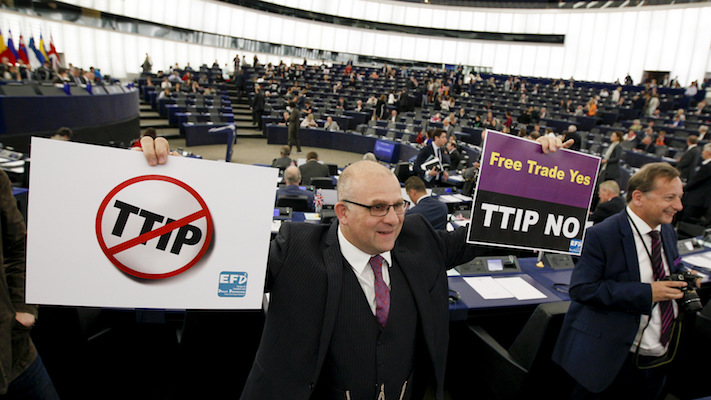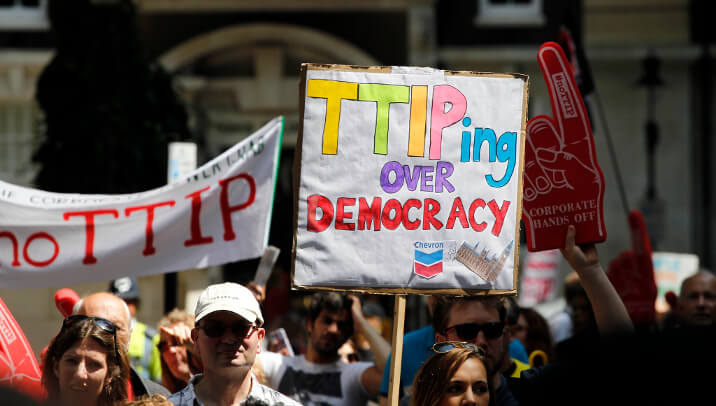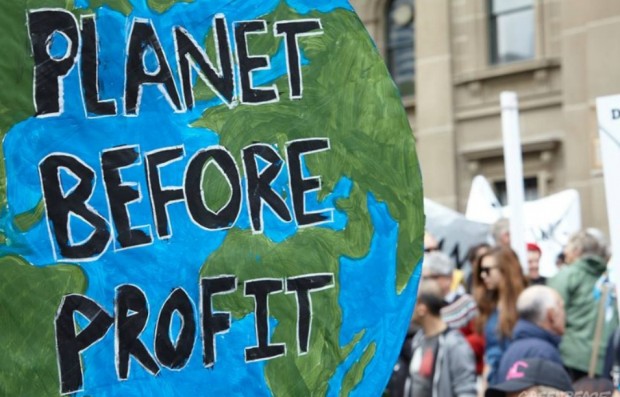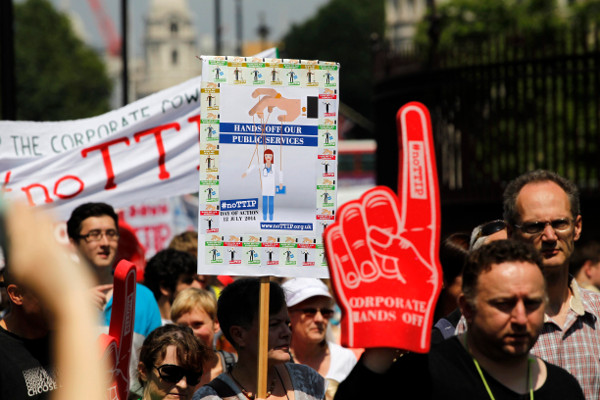Interview with Susan George, philosopher and political analyst. President of the Planning Committee of the Transnational Institute in Amsterdam. Former Vice President of ATTAC France.
During her visit to Barcelona to attend the 4º Seminario de Convivencia Planetaria, Construimos Biocivilización, we had the opportunity to meet with Susan George. In this brief interview she tells us about the TTIP and the possible consequences of its signing, also about her vision about the new political parties and movements that have emerged in Europe and the importance of citizen participation.
By Raquel Paricio and Esther Vazquez
Direct consequences of signing the TTIP (Transatlantic Trade and Investment Partnership)
The direct consequences for people, for individuals is that very likely the food we import would be chemically treated, would be genetically modified, would have no labels. You wouldn’t know exactly what is in your food. You could buy chicken that has been rinsed in chlorine, you could have beef that was raised with hormones, you could have biosynthetic food made out of one gene of a plant another of an animal, and this would not be labeled.
The Americans definitely want to get rid of geographical indications. That means, you couldn’t sell your ham as serrano ham, it is just ham. A wine might still have a geographical indication. But for example they say champagne is a generic name you can make champagne in California, it doesn’t have to come from the region of Champagne in France.
In the area of health the pharmaceutical companies are trying to get rid of generic drugs. They have already succeeded in forcing the generic drug companies to repeat all of the clinical trials that they have already had to do with the same identical medicine but which has a brand name. To make it a generic drug you have to start all over again: clinical trials, blind tests, etc. So medicine would become much more expensive.
In the area of agriculture again, it is very likely that we would lose a great many farmers, because if we lower the tariffs of agriculture we will have a flood of American corn and basic grains flooding into Spain and that will ruin a lot of farmers, exactly the way the ”campesinos” in Mexico were ruined by the North American Free Trade Agreement, the NAFTA.
There would be other impacts which it is impossible to say now exactly what they would be but the European Commission began by saying, oh this will mean an increase of GDP, and every European family of four people will have an extra 560€ but this study that they conducted has been completely disproven. It has been shown to be based on models which are totally unrealistic. They use the model in which, you will not believe this but…, in which unemployment does not exist. It is always full employment, because if there are no jobs in this sector, there will be jobs in another sector, etc.
So, that is the kind of model they use. In fact, other economists have shown that this would be costly in jobs, we will lose even more jobs than now and it would not be beneficial, or beneficial in such a marginal way and after twenty years, that it wouldn’t make much difference at all.
But at the same time it is a gift to transnational corporations, and that is what the TTIP is about. It is about giving corporations the freedom to sue governments if they don’t like a law that the government has passed.
We have a lot of examples now, because in hundreds of bilateral treaties this private judiciary system exists, and for example, the government of Egypt raised the minimum wage and a company, an important company Veolia, from France, sued them because they would have to pay their workers more. This case has not been decided yet, but one case that has been decided is for example, Ecuador, which refused that an American petroleum company could drill in a particular region. Well, they said this is a protected area and you cannot drill here. And the company said, ah, we will sue you; and they won. And they have a fine on Ecuador of 1.8 billion dollars which is a lot of money for a small and fairly weak country.
So we would have a privatized judiciary where investors could sue governments for any law that they say is harming their profits.
The other thing is that the corporations want to be present where and when the regulations are made, so that if you have, as we have Volkswagen, which is emitting far more CO2 than they said, everybody knows about the Volkswagen scandal now; this would become legal probably, because if the corporations were making the laws they would make laws to suit themselves.
And they say we want to harmonize the regulations, but that means touch the bottom, and in general, not always, but in general, European regulations are stronger and more protective than American ones, which are here.
I like to give the example of chemicals where in the last several decades Europe has got rid of 12,000 chemicals which are forbidden on our markets and during the same period the Americans have only got rid of 5.
And it’s up to the system of the Americans, it’s up to the agency that regulates chemicals to say within a period of three months this is illegal and you have to take it off the market. And it is very hard to get that from the regulatory agency within a short period.
Well, as in Europe we say we doubt, we have doubts about the safety of this product or this process. And therefore we would say: no, until we have proved that it is safe, you see it is the opposite system. In the US it’s safe until is proven harmful, in Europe is harmful until it is proven safe.
So, all of these things would change our daily lives, and for the rest I can’t tell you the detail because the document is so secret, It hasn’t been signed yet, even our representatives are prevented from knowing very much; they have to swear they will not disclose what they read, in the secret room, they cannot be very helpful, it is not their fault.
But it really is a threat to democracy and it is a gift to the transnational corporations which are already, as you know, extremely powerful.
The power of new political actors like Ada Colau
They don’t have the power but they have a lot of symbolic power. Ada Colau just had a meeting in Barcelona of many cities and regions that have declared themselves TTIP free zone.
And that is symbolically powerful, it doesn’t mean that they could really escape if the Spanish government signed. But it does mean that there is a significant political opposition and this has to be heard in Europe and this has to be heard in the United States.
France has a lot of areas. We began this in France in 2004 and 2005 because we had an entire general agreement on trade and services campaign, the GATS, General Agreement on Trade and Services, was part of the World Trade Organization negotiations, and they wanted to put many more services, including public services into the World Trade Organization treaty, and we defeated that by having a campaign with more than 1,000 French organizations of a municipal or regional level who said “we are a GATS free zone”.
And this has been picked up again now for the TTIP, so I think it is a movement which should be encouraged all over and as soon as enough European countries have enough municipalities; this would be a great pressure on the European Commission, just as the marchers and the number of signatures in Europe has been already a pressure.
We have 3.4 million signatures from all over Europe against this treaty, so this shows that citizens are aware. And it is the first time that western, central and eastern Europe has been together on an issue.
21 countries reached their quotas, as set by the European Union, to say no to the CETA, the agreement with Canada and also on the TTIP, so that is a good sign. We are making progress.
New movements in Europe like DIEM 25, PLAN B, NUIT DEBUT
Questions about the future I can’t answer them any better than anybody, you know.
But I think the more movements like this there are, and there are several, there is one that is called Plan B, there is Varoufakis with the DIEM, Democracy in Europe Movement. There are other efforts now. There are young people gathering in France, the Nuit Debut, and they are being imitated in other countries. And the more, the better.
Because Europe is really in a crisis, we don’t feel we can trust the Commission we feel that it is antidemocratic, not just that there is a democratic deficit, but there is antidemocratic policy to stop listening to what people say.
So, the more movements like this, the better it is. And the Varoufakis DIEM movement says we are going to try to do this in stages, for another ten years. First we have to get rid of the secrecy because we are kept in the dark about European plans and citizens need to be informed. So the first thing is to get rid of the opacity of the way we are governed.
It is very important also to have a democratically organized Europe, because right now, the President of the Eurogroup, Mr. Jeroen Dijsselbloem is not elected. Mr. Mario Draghi, Head of the Central Bank is not elected. Monsieur Junker is elected in a very indirect way. So, you only have the Parliament but the people who have the real clout are mostly unelected bureaucrats and they just live in a world of their own, they are up there in the stratosphere somewhere making rules and then everybody learns about them too late and we don’t have a discussion.
There is something very dangerous that has just happened but we didn’t have time to organize against it. And that is the law on Business Secrecy. The directive on Business Secrecy, where if you disclose anything about a business, that business can sue you if you are a whistleblower. And it is ironic because right now, this week there are two young men being tried in Luxembourg because they were the ones who took the information that allowed us to know about Luxleaks.
Luxleaks is the name for the Luxembourg system where they made agreements with dozens if not hundreds of companies, so that those companies could put all their profits in Luxembourg, in tax terms and pay very very small rates of tax.
So, we have had a parliamentary report in France that says if we didn’t have tax havens like this, the government would have at least 60 to 80 billion Euros extra every year to put in the budget. That’s what we need for social security, that’s what we need for schools… and we are not receiving these taxes, so we have to have a tax system which functions for the largest corporations. We have to have a tax system which says to the rich individuals you have to stop using tax havens, etc. Because citizens are being told, well you have to pay and we do because we have a fixed address, we are not using the Cayman Islands to put our money.
So any movement, I think, that is fighting against this secrecy, that is fighting against this arbitrary way of governing us and allowing all kinds of rich people and rich firms to escape their share of the upkeep of Europe of the tax base; those are good things to have. And the more, the better.
How can the system change: Self Organized Criticality
People always want to know when are things going to change and that is a question I can’t answer. But what I try to explain is, there is a concept in science which is called Self Organized Criticality. That sounds complicated. It is not very complicated.
What it means is that a system in science; it can be as simple as a sand pile. It is constantly receiving inputs from the outside world. So let’s say we have got a sand pile here, it is high like that, and there is a grain of sand that is dropping every moment… all the time.
At some point, which you can’t say, I can’t say; at some point this extra grain of sand, you can’t predict and I can’t predict, at some point this grain of sand, the next one is going to make an avalanche and the whole system will have to be reconfigured, it won’t look the same.
And I see no reason why this should not be the case in politics and in societies. So when people say, I’m just one person, what can I do? And I can say, join a group and help that group to be one element, the grain of sand that makes the whole system collapse.
And we can’t say when that will happen. But we do know that an extra something, it could be in the Artic, Antarctic, there is just one hundredth of a degree more in warming which makes a part of the iceberg cleave off and the iceberg is no longer there and the whole thing begins to melt.
So, every physical system is like that and I believe human systems are like that as well. And that is why I argue that we need you, whatever your profession is. We need that extra television broadcast, we need that extra article in a newspaper, we need that extra organization which will bring their group together, and somebody says something and suddenly politicians understand, suddenly the system reconfigures itself.
So that is what Self Organized Criticality is in the political sphere.











